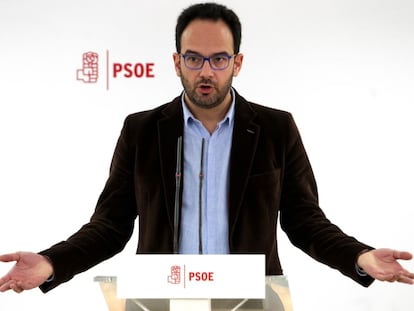Socialists confident divisions in Podemos will deliver abstention
Party leader Iglesias’ refusal to back PSOE chief’s PM bid sees him lose most ground in Metroscopia poll

Spaniards awoke on Monday to a new week of stalled talks on the issue of who is going to be the country’s next prime minister.
After an inconclusive election on December 20 that yielded a hung parliament, a series of failed attempts at coalition-building, and an unsuccessful bid for office by Socialist leader Pedro Sánchez, who was defeated in both rounds of the investiture vote, the hope now is that one party’s crisis may be another group’s ticket to the top.
Several leading pro-Podemos figures have recently spoken up regarding the convenience of getting closer to the Socialists
The Socialist Party (PSOE), which once tried to build a “coalition of progress” with other leftist forces but failed to enlist the necessary support from Podemos, is now hoping that the anti-austerity party’s internal crisis will make it reconsider its position.
Specifically, PSOE leaders hope that Pablo Iglesias and his team will change their “no” to Sánchez into an abstention, thus paving the way for the Socialist chief to become prime minister.
The Socialists earned 90 seats at the December election, far from the 176 required for an overall congressional majority. Since then, they have been courting Podemos (69), the reform party Ciudadanos (40) and smaller regional groups in order to reach that figure. So far, Sánchez has only managed an alliance with Ciudadanos and with the Canaries Coalition (one seat).
Meanwhile, the conservative Popular Party (PP) secured 123 seats in December, but has failed to find backers for a renewed term for acting prime minister Mariano Rajoy – who has not even tried to bid for the post.
Voters still rejecting the old two-party system – poll
The investiture debate in early March yielded one clear winner: Ciudadanos leader Albert Rivera. A survey by Metroscopia for EL PAÍS found that voters saw him as the political leader with the greatest ability to reach across the aisle and the most constructive rhetoric.
Meanwhile, Podemos leader Pablo Iglesias suffered because of his aggressive tone at the debate, and could lose third place to Ciudadanos in a hypothetical new election.
The survey shows that the PP would obtain a similar result, as would the Socialists.
Overall, the poll shows that Spaniards are still refusing to go back to the old two-party system.
If no progress is made in the coming weeks, Spain will face a fresh election in late June. But with polls showing that Podemos would fare worse, Socialist leaders are hoping that Iglesias will try to avoid a new ballot, and accept to abstain in order to let Sánchez govern while retaining his own current congressional muscle.
Recent conflicts within Podemos’s federal leadership, combined with a chance that regional groups that ran with Podemos in December would run independently in a fresh election, are revealing a new weakness in a party where there is a growing rift between supporters of leader Pablo Iglesias and adherents of his number two official, Íñigo Errejón.
Also, several leading pro-Podemos figures have recently spoken up regarding the convenience of getting closer to the Socialists. Madrid Mayor Manuela Carmena, whose Ahora Madrid alliance includes Podemos, has talked about a hypothetical investiture deal between the PSOE, Podemos and Ciudadanos in order to eject the PP from power.
But so far, Podemos is refusing to join any alliance that includes Spain’s other newcomer party, Ciudadanos.
English version by Susana Urra.
Tu suscripción se está usando en otro dispositivo
¿Quieres añadir otro usuario a tu suscripción?
Si continúas leyendo en este dispositivo, no se podrá leer en el otro.
FlechaTu suscripción se está usando en otro dispositivo y solo puedes acceder a EL PAÍS desde un dispositivo a la vez.
Si quieres compartir tu cuenta, cambia tu suscripción a la modalidad Premium, así podrás añadir otro usuario. Cada uno accederá con su propia cuenta de email, lo que os permitirá personalizar vuestra experiencia en EL PAÍS.
En el caso de no saber quién está usando tu cuenta, te recomendamos cambiar tu contraseña aquí.
Si decides continuar compartiendo tu cuenta, este mensaje se mostrará en tu dispositivo y en el de la otra persona que está usando tu cuenta de forma indefinida, afectando a tu experiencia de lectura. Puedes consultar aquí los términos y condiciones de la suscripción digital.










































